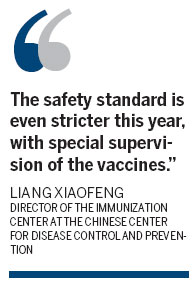Society
Measles jabs declared safe in China
By Jin Zhu and Wang Hongyi (China Daily)
Updated: 2010-09-08 07:36
 |
Large Medium Small |

BEIJING - Health authorities have assured the public of the quality of domestically-made measles vaccines in response to public fear over the upcoming nationwide measles immunization campaign.
"All the vaccines to be used in the campaign comply with international standards and are made by qualified enterprises in Beijing, Shanghai, Wuhan and Lanzhou," said Liang Xiaofeng, director of the immunization center at the Chinese Center for Disease Control and Prevention.
The announcement came following a widely circulated rumor, mainly via the Internet and mobile phone text messages, that the vaccines to be used in the mass immunization campaign were manufactured in the United States and poisonous.
"The safety standard is even stricter this year, with special supervision of the vaccines' manufacture, storage, transportation and administration," he said during an online interview on Tuesday.
The free 10-day vaccination program, funded by the central government, will start on Sept 11, benefiting about 100 million children on the mainland. The vaccination is free and voluntary.
To achieve the goal of eliminating measles by 2012, the country will vaccinate children mainly between 8 months and 4 years old, according to the Ministry of Health.
In Shanghai, officials from the city's public health hotline said they received more than 2,000 calls inquiring about the measles vaccine each day, almost three times the usual number of calls.
"Allergic reactions and vaccine side-effects are the most troublesome issues for the public," one of the hotline operators said.
Two vaccine teams with 12 medical staff members will be sent to local kindergartens and schools, said a doctor, surnamed Lu, from the Zhangjiang Community Medical Service Center in Pudong District.
There will also be 8,000 more children vaccinated at the center, he said.
"Many children will be vaccinated at the same time, so I don't think hospitals can get enough vaccines, which have been tested as safe, within such a short time," said a Beijing resident, surnamed Wu, who has a 4-year-old son.
"My son was vaccinated when he was about 1 year old, so I wondered whether it is necessary for him to be vaccinated again," she added.
Luo Huiming, deputy director of the Chinese Center for Disease Control and Prevention's immunization center, said the vaccine for preventing measles has been used in China since 1966 and has proven to be safe.
From 2004 to 2009, measles immunization campaigns were launched in 27 provinces with 186 million doses, which have largely reduced the number of measles cases, he said.
The country's routine measles immunization program, introduced in 1978, reaches about 80 percent of the population.
Routine measles vaccinations for children, combined with mass immunization campaigns in countries with high case and death rates, are key public health strategies to reduce measles deaths globally.
Two doses of the vaccine are recommended to ensure immunity.
Measles can be eliminated in a country only when more than 95 percent of the population has immunity, Luo said.
"A small percentage of children who receive the vaccine in China don't develop immunity to measles. But currently there is no easy, cheap and fast test that can tell if a child has immunity to measles or not," said Vivian Tan, spokeswomen for the World Health Organization's (WHO) Beijing office.
Xing Yu contributed to this story.



